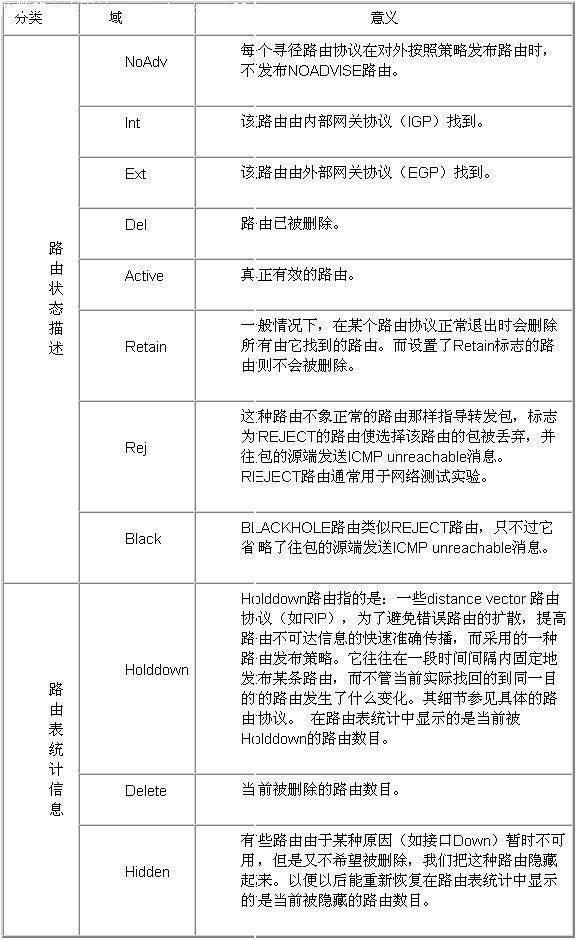 打印本文
打印本文  关闭窗口
关闭窗口 配置或删除静态路由。
[ no ] ip route ip-address { mask mask-length } { interfacce-name gateway-address } [ preference preference-value ] [ reject blackhole ]
【参数说明】
ip-address和mask为目的IP地址和掩码,点分十进制格式,由于要求掩码32位中‘1’必须是连续的,因此点分十进制格式的掩码可以用掩码长度mask-length来代替,掩码长度为掩码中连续‘1’的位数。
interfacce-name指定该路由的发送接口名,gateway-address为该路由的下一跳IP地址(点分十进制格式)。
preference-value为该路由的优先级别,范围0~255。
reject指明为不可达路由。
blackhole指明为黑洞路由。
【缺省情况】
系统缺省可以获取到去往与路由器相连子网的子网路由。在配置静态路由时如果不指定优先级,则缺省为60。如果没有指明reject或blackhole,则缺省为可达路由。
【命令模式】
全局配置模式
【使用指南】
配置静态路由的注意事项:
当目的IP地址和掩码均为0.0.0.0时,配置的缺省路由,即当查找路由表失败后,根据缺省路由进行包的转发。
对优先级的不同配置,可以灵活应用路由管理策略,如配置到达相同目的地的多条路由,如果指定相同优先级,则可实现负载分担;如果指定不同优先级,则可实现路由备份。
在配置静态路由时,既可指定发送接口,也可指定下一跳地址,到底采用哪种方法,需要根据实际情况而定:对于支持网络地址到链路层地址解析的接口或点到点接口,指定发送接口即可;对于NBMA接口,如封装X.25或帧中继的接口、拨号口等,支持点到多点,这时除了配置IP路由外,还需在链路层建立二次路由,即IP地址到链路层地址的映射(如dialer map ip、x.25 map ip或frame-relay map ip等),这种情? 配置静态路由不能指定发送接口,应配置下一跳IP地址。
【举例】
配置缺省路由的下一跳为129.102.0.2。
Quidway(config)#ip route 0.0.0.0 0.0.0.0 129.102.0.2
【相关命令】
show ip route,show ip route detail,show ip route static
2.show ip route
显示路由表摘要信息。
show ip route
【命令模式】
特权用户模式
【使用指南】
该命令输出以列表方式显示路由表,每一行代表一条路由,内容包括:
目的地址/掩码长度
协议
优先级
度量值
下一跳
输出接口
【举例】
以下是引用片段:
Quidway#show ip route
Routing Tables:
Destination/Mask Proto Pref Metric Nexthop Interface
127.0.0.0/8 Static 0 0 127.0.0.1 127.0.0.1(LO0)
127.0.0.1/32 Direct 0 0 127.0.0.1 127.0.0.1(LO0)
138.102.128.0/17 Direct 0 0 138.102.129.7 138.102.129.7(EN0)
202.38.165.0/24 Direct 0 0 202.38.165.1 202.38.165.1(SL1)
【相关命令】
ip route,show ip route detail,show ip route static
3. show ip route detail
显示路由表详细信息
show ip route detail
【命令模式】
特权用户模式
【使用指南】
该命令输出信息帮助用户进行路由方面的故障诊断。
【举例】
以下是引用片段:
Quidway#show ip route detail
Route state description
NoAdv: do not advertiset Int: AS Interior route
Ext: AS External route Del: route to be deleted
Active: current route Retain: route retains in the routing table
Rej: rejecting route Black: black hole route
Routing Tables:
Generate Default: no
+ = Active Route, - = Last Active, * = Both
Destinations: 4 Routes: 4
Holddown: 0 Delete: 9 Hidden: 0
**Destination: 127.0.0.0 Mask: 255.0.0.0
Protocol: *Static Preference: 0
NextHop: 127.0.0.1 Interface: 127.0.0.1(LO0)
State: $#@60;NoAdv Int Active Retain Rej$#@62;
Age: 19:31:06 Metric: 0/0
**Destination: 127.0.0.1 Mask: 255.255.255.255
Protocol: *Direct Preference: 0
NextHop: 127.0.0.1 Interface: 127.0.0.1(LO0)
State: $#@60;NoAdv Int Active Retain$#@62;
Age: 114:03:05 Metric: 0/0
先显示用于路由状态描述的符号,然后输出整个路由表的统计数字,最后依次输出每条路由的详细描述。 其含义如表4-1所示。

表4-1 路由表信息
【相关命令】
ip route,show ip route,show ip route static
4.show ip route static
显示静态路由表。
show ip route static
【命令模式】
特权用户模式
【使用指南】
根据该命令输出信息,可以帮助用户确认对静态路由的配置是否正确。
【举例】
Quidway#show ip route static
Static routes for family INET: (* indicates gateway(s) in use)
1.2.3.0/24 pref 60 $#@60;Int$#@62; intf EN0
127.0.0.0/8 pref 0 $#@60;NoAdv Int Retain Rej$#@62; intf 127.0.0.1
以列表的方式显示静态路由表,每一行代表一条静态路由,从左到右依次为:
目的地址/掩码长度
优先级
$#@60;状态参数$#@62;
输出接口和下一跳
【相关命令】
ip route,show ip route,show ip route detail
 打印本文
打印本文  关闭窗口
关闭窗口